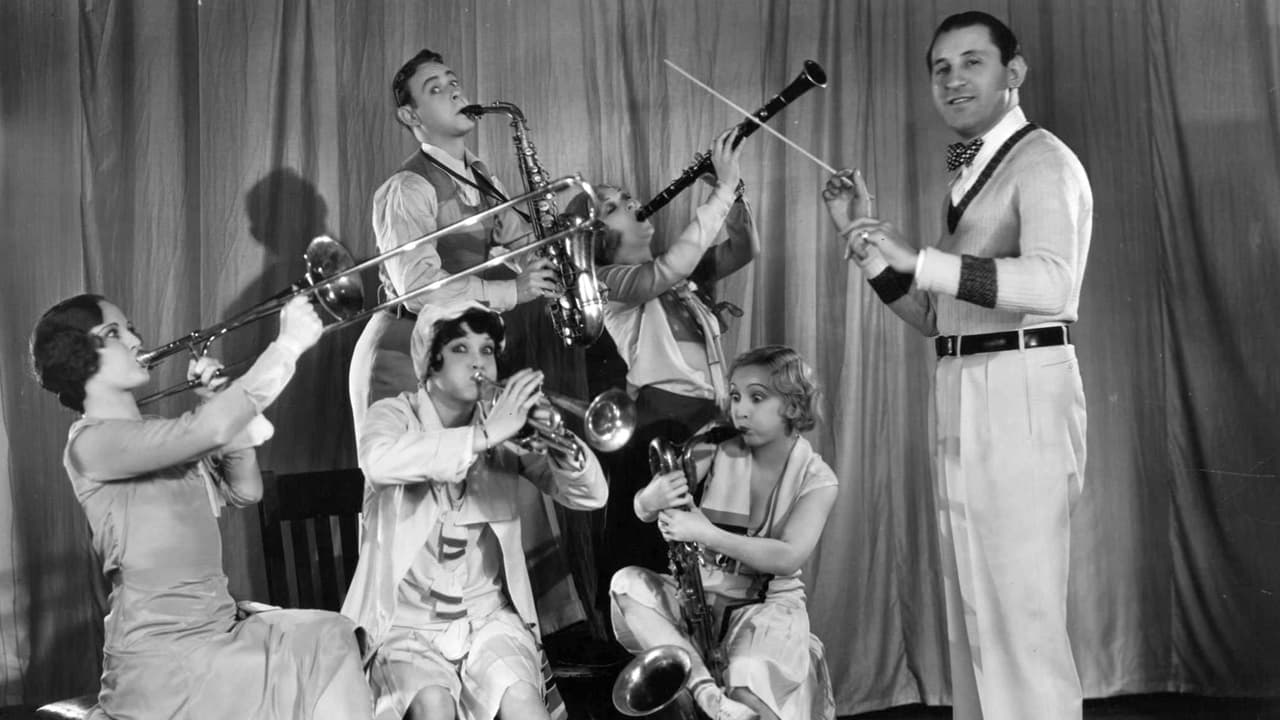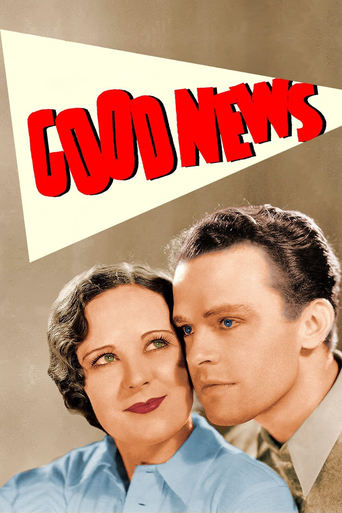

Bubbly Dorothy McNulty and vibrant Bessie Love are the real reason to watch this film that was the stage origin for all those collegiate musicals. By the time MGM bought "Good News" to the screen it was not only compared badly to other college films around (the stage show had been the instigator) but people thought it was old hat!! What was worse was that originally it had been advertised as containing no fewer than 15 songs but as the studio became worried over the dive in popularity that musicals were taking, many of the already filmed production numbers were canned. The two that were retained were the show's highlights. Bubbly Dorothy McNulty from the Chicago production played flapper collegiate Flo who's "let's make Tate known for the Varsity Drag" - as desks are cleared away for dancing co-eds (Ann Dvorak among them) to take centre stage which includes frenetic Flo with tapping so energetic, shoes start to smoke!! and she is wheeled off at the end, exhausted through so much energy!! Even Harry Earle jumps out of a paper bin!Forget the leading lady - Mary Lawlor was from the original Broadway cast but her role could have been played by any half decent ingénue - she plays Connie, a "four eyes" college swat ridiculed for her dowdy dress sense but within minutes of being assigned to help Tom (Stanley Smith) pass his astronomy (!!!) exam so he can play in the big game, is given a make over by Flo and Tom realises that she is the girl for him. Alas, he has already pledged his love to Pat (Lola Lane who is very cute) who is holding him to his promise of marriage - if he wins the big game!!! As Ukelele Ike sings "I'm Pessimistic".... about how this will all pan out!!Far more interesting is zippy Bessie Love as Babe, the campus vamp - "I'm not hard to get but hard to get away from"!!! She sets her cap at Bobby Randall who for all his years at college has never been called to play and he is getting pretty fed up. Gus Shy was also from the original Broadway cast and probably the oldest looking college kid on film - he was in his mid thirties and didn't look a day over 40!! He reminded me of a youngish Harry Green. but he and Bessie were responsible for "Gee, But I'd Like to Make You Happy", first reprised in a risqué version then sung straight with a cute novelty dance. "Ladies Man" is featured as background music as Bobby sorts through photos of his "would be" romantic conquests and the lovely "The Best Things in Life Are Free" is thrown away as Smith sings one verse and then is cut off. The "Good News" number is filmed as it was on the stage with lots of zippy tapping college cuties led by Flo with front flips and splits then Al "Rubberlegs" Norman comes on for a "you'll have to see it to believe it" eccentric dance!! Lost is the Technicolor "Football" "jazz wedding" finale where all the muddled love affairs are sorted out. And Thomas Jackson who was so memorable as the detective in "Little Caesar" plays the football coach!!Even though at just under 90 minutes it played a bit disjointedly, Variety said "it's too fast, too peppy and too entertaining to flop" and I reckon they were right!!!Highly Recommended.
... View MoreThis is not the most awful movie musical MGM made. As a matter of fact, in some respects, it is much better than the Peter Lawford/June Allyson version. But it shows its age terribly and either misuses or abuses some rather fine talent. I agree with others that Penny Singleton steals the film. Her renditions of Good News and Varsity Drag hold the film together. What is so disturbing is the total mishandling of Bessie Love, who could entertain with charm and grace, and Cliff Edwards, whose musical efforts are poorly staged and weakly conceived. The others in the film are best forgotten, not because they are bad actors but because they are so badly directed and completely uninspired that they chew up the scenery and mug incessantly. One wonders about MGM's selection of director, usually a sensible and sensitive choice. Perhaps Thalberg was on vacation.There is little or no camera movement and the one or two good moments in the film, such as the brief and crude animation sequence, are too soon forgotten.But worth sitting through the first half for Penny Singleton's tour de force as a singer/dancer. And once that is finished, you'll be as happy as I that some kind soul lost the final reel.
... View MoreGOOD NEWS is an MGM musical based on the smash 1927 Broadway musical that ran for 16 months and starred Mary Lawlor and Inez Courtney as Connie and Babe, and Gus Shy as Bobbie.In the film version, Lawlor and Shy repeat their stage roles, but Bessie Love takes over as Babe. While many fans of musicals are familiar with the 1947 version (starring June Allyson), the original film version sticks close to its theatrical roots. This is both good and bad. While this version has a ton of pep and some imaginative staging and choreography, the acting is mostly wooden, and the dialog and slang were already creaky in 1930. The sound recording is surprisingly bad in many spots.What this film has going for it is a terrific central performance by Bessie Love as the zippy co-ed who gleefully chases after her man (Shy). While Love's musicals numbers have been largely lost on other MGM films like CHASING RAINBOWS, here she gets to sing a little and dance a little. She also gets to throw herself into the physical comedy, like the scene where she's hiding (along side a cake) under a bed from her old boyfriend, Beef (played by future writer/director Delmer Daves). Before he leaves he sits on the bed, shoving Bessie's face into the cake. She's terrific. Also great are MGM stalwart Cliff Edwards (Ukulele Ike) as Pooch and Penny Singleton (billed as Dorothy McNulty) as Flo. Singleton is pretty amazing as lead dancer in the "Varsity Drag" and "Good News" numbers. Stanley Smith is OK as Tommy but sings well. Lola Lane is thrown away as Pat. Gus Shy (who looks about 40) is way too stagy to be effective. MGM scuttled a few of the songs as the craze for musicals died while they were filming this one. Pity. The songs are really good and very representative of the era. Still, GOOD NEWS was a hit at the box office, probably due to the popularity of Bessie Love. The best number is the lively "Varsity Drag." As the prof leaves the classroom and admonishes the students to use the free minutes to study, they instead push back the chairs and launch into a torrid version of the famous dance. Singleton sings and dances here and the number becomes truly cinematic when, in a great shot, the camera zeroes in on the blackboard where chalk figure of Roman generals start doing the drag. The bottom of the screen shows only the heads of the dancers who are in front of the blackboard. Later the camera zooms in on the dancers' shoes, which are smoking from the workout. It's great stuff.Singleton again leads the dancers in the "Good News" number, which also features famed rubber-legged dancer Al Norman. Also in the cast are Ann Dvorak (chorus) Vera Marshe (the pretty blonde), Billy Taft, Thomas Jackson (the coach), Buster Crabbe (football player), Frank McGlynn (Kenyon), and for no reason at all Harry Earles. GOOD NEWS was Love's last Hollywood musical and Lawlor's last film. The 2-strip Technicolor wedding finale is now sadly lost.
... View MoreWatching Penny Singleton in this movie was a revelation, and for those who think of her only as the staid title character of the "Blondie" series should catch this movie if only to see her. She's billed 11th (as Dorothy McNulty) but is the centerpiece of two of the big production numbers involving singing and dancing: "The Varsity Drag" and the title song "Good News." Her immense talent is evident as she does her high kicks, somersaults, cartwheels and splits and delivers the rapid-fire lyrics with uninhibited abandon. She was an absolute joy to behold! In addition, Gus Shy, the Danny Thomas look- talk- and act-alike, provides some good comedy that is complemented by that of Bessie Love and Cliff Edwards, while Lola Lane, Mary Lawlor and Stanley Smith provide the love interest. With 11 or so songs, including the ever-popular "The Best Things in Life Are Free," this movie is definitely worth seeing and compares favorably with the 1947 remake. My one complaint was the lack of closeups, although there was a good full-head closeup of Singleton singing "The Varsity Drag." It was very effective.Before the movie was shown on the Turner Classic Movies (TCM) channel, some titles informed us that the last half of the final reel was filmed in an experimental color process and is now lost. But the ever-resourceful station put together some stills at the end with subtitles to describe the outcome. The movie ran 84 minutes instead of the original 90 minutes.
... View More